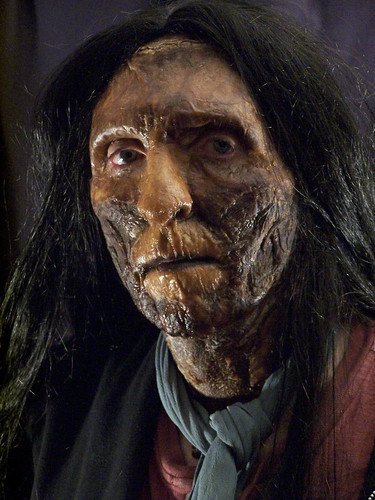Specialist makeup courses can lead to great careers, but require a bit of thought and timing, as well as a lot of effort. Examples of specialist makeup courses might include specific courses at colleges and universities for film, television and theater makeup. These vocational courses will focus on different techniques and contexts for understanding specialist makeup, and are often combined with hair and fashion courses for professional use.
Once these courses are completed, graduates have several possible routes to take, from gaining entry to the film and television industry, to working in magazines, or as freelance makeup specialists. When planning a career in specialist makeup, it is also important to have a strong portfolio, and to invest in union membership.

cc licensed flickr photo from Derrick Tyson
1 - Film, Television and Theater Careers
One of the major routes for specialist makeup graduates is into film, television and theater work. Makeup artists that find a role in these industries have regular work on productions, and usually work as part of large crews for different tasks. A makeup artist might also specialize in a particular format, whether that be historical makeup, or makeup for children’s television shows in television, or in musicals for theater. Working in these industries requires a lot of perseverance, as well as a willingness to travel, and to intern for a period to gain experience and contacts.
2 - Live Events
Fashion shows and other live events demand talented makeup artists that can provide work at a rapid pace. Live events offer distinct challenges, as well as the opportunity to make large sums of money for one off pieces of work. Working on a freelance basis or as part of an agency, a makeup artist can receive consistent work once they have established themselves within the field.
3 - Magazines and Publishing
Specialist makeup artists can also receive work within the magazine and publishing industry by working on photo shoots. These kind of roles involve working with photographers and models, and can be a useful bridge between film and television work, as well as working within the fashion industry.
4 - Creative Makeup for Salons and Spas
Many salons and spas will require specialist makeup artists that can provide particular effects for special events. These skills might include providing a certain makeup effect for an occasion, or may involve working with a client to add temporary tattoos and other effects. You may also be able to charge higher personal rates for working within a salon and spa.
5 - Portfolios and CVs
Any prospective career as a specialist makeup artist requires investing time and effort into building a reputation, and getting the right contacts. A strong CV and cover letter should be regularly worked on and updated, while it is worth having a portfolio that can be sent out to clients and agencies. A personal website an also act as a good way of promoting your work. Moreover, it is worth joining a professional group or union to gain a better network of contracts. Examples of these unions include the National Association of Screen Make-Up Artists and Hairdressers.
About the Author
Matt Mynors is a freelance copywriter, currently writing on fashion and lifestyle topics for make up brush specialists Crown Brush.


{ 1 comment… read it below or add one }
I am continuously invstigating online for posts that can assist me. Thx!